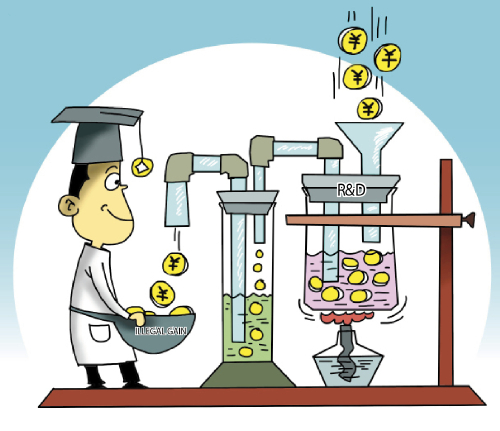|
 |
|
(CFP) |
"Many problems exist in research funding management, and two of the most prominent are fragmented management and lack of focus in science and technology programs," said Zhang Xiaoyuan, Director of the Department of Facilities and Financial Support of the MOST.
According to Zhang, these problems suggest that the current management system and government departments' roles be not compatible with the general trend in innovation and industrial revolution.
"The government should implement a growth-through-innovation strategy, and be resolute in transforming its own functions, streamlining itself and delegating powers, and deepen reform in the management of science and technology programs," Zhang said.
Carefully designed reform
For years, new science and technology programs have been simply piled on top of old ones, leading to overlapping funding.
Before the State Council's reform plan was launched, the MOST and the MOF made an in-depth analysis of salient problems in research funding management.
"We analyzed the nearly 100 government-sponsored R&D programs one by one to figure out what should be integrated and optimized," said Zhao Lu, Director of the Education, Science, Technology and Culture Department of the MOF.
Zhao said that this reform will affect the allocation of more than half of the Central Government's science and technology budget.
Zhang Xian'en, a researcher with the Institute of Biophysics, Chinese Academy of Sciences, took part in several discussions on the draft reform plan. He said that the research funding reform has responded to problems at three levels.
"It increases the efficiency of resource allocation at the national level, addresses the difficulty in coordination at the departmental level, and at the individual level, it saves researchers' energy and time dealing with the red tape of multiple regulatory agencies," Zhang Xian'en said. "The reform is extensive and has been rolled out faster than expected."
The research funding reform will push forward other reform initiatives in science and technology, and create a favorable environment for implementing the development-through-innovation strategy, Wan commented.
On the other hand, recent developments in science and technology require us to think outside of the box and explore new research and development models, he added.
Changing government role
Complicated research funding systems lead to inefficiency. Chinese researchers on average spend 51 percent of their work time on research, and most of the remaining time on applying for funding, reported China Youth Daily.
Moreover, some researchers even fabricate research projects to win grants. The practice contravenes academic ethics and the purpose of fiscal funding.
Abuse of research funds and other related corruption cases has given rise to questioning about China's current research funding system.
In addition, research results still cannot meet national development needs. In particular, many important areas call for significant scientific and technological breakthroughs to remove development bottlenecks, Zhang Xiaoyuan said.
According to the State Council's reform plan, a cross-ministerial meeting coordinated by the MOST will deliberate on important matters, set procedural rules, review science and technology development strategies and key tasks, designate members of advisory and evaluation committees, and select professional agencies to handle funding applications.
Entrusting program management to professional agencies is a highlight of the reform.
The delegation of government departments' power in managing science and technology programs marks a "real step forward" in the science and technology system reform, a researcher with the Chinese Academy of Sciences told Beijing Review.
By detaching itself from managing specific projects, the government can better perform its functions while letting the market play a decisive role in the allocation of resources, the researcher said.
"Of course, that does not mean that the government will stay out of everything. Rather, it will sign consignment agreements with professional agencies, and standardize project evaluation rules," Zhang Xiaoyuan said. He added that the MOST and the MOF will regularly evaluate the performance of professional agencies, and set up a mechanism to hold them accountable retrospectively for their decisions. "These agencies will also be overseen by the general public," he said.
In addition to existing science and technology management agencies such as the National Natural Science Foundation of China, more such professional agencies will be established in strict accordance with pre-set qualification requirements and they must be properly supervised, Zhao said.
| 